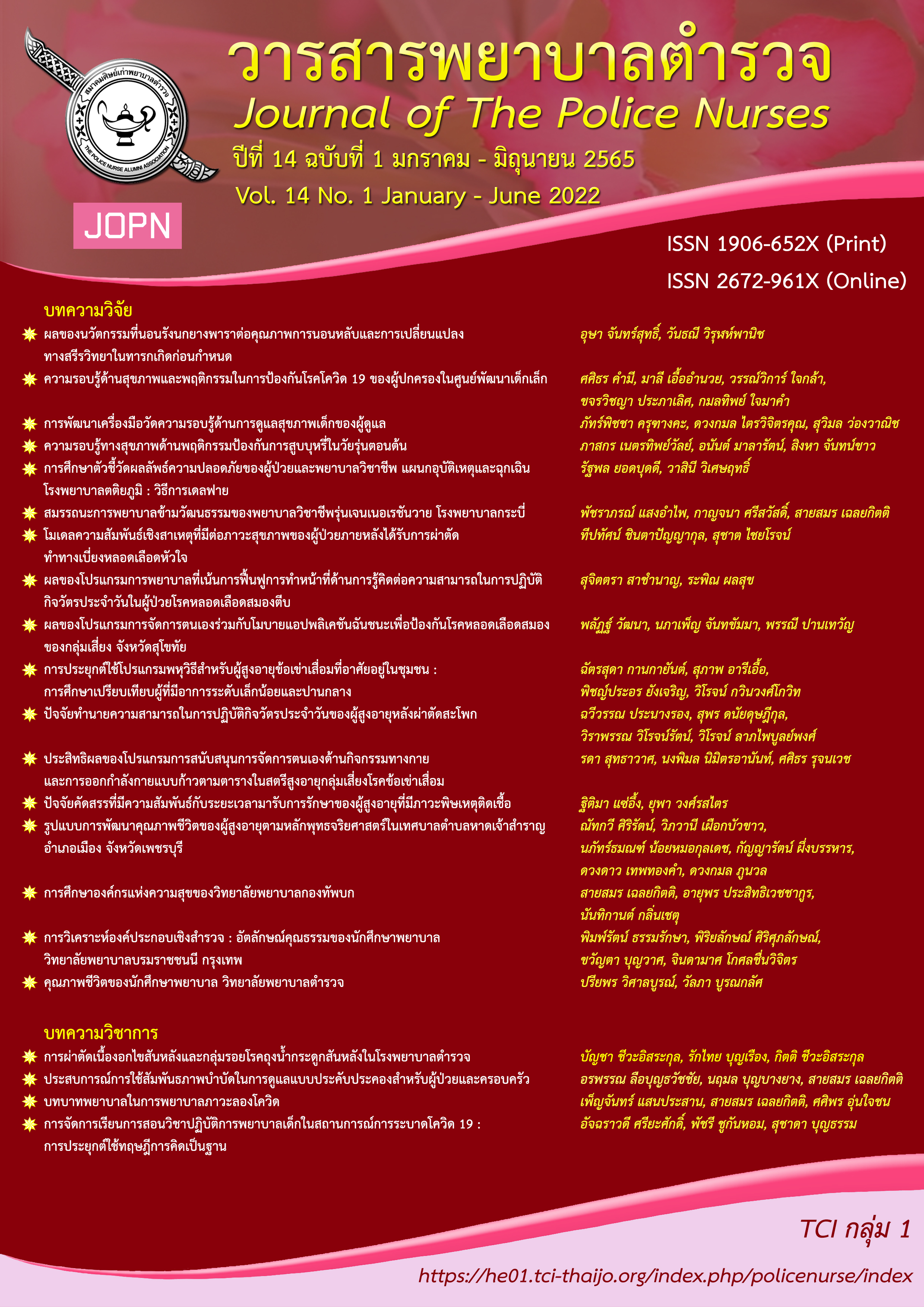THE EFFECT OF REHABILITATION NURSING CARE FOCUSING ON COGNITIVE FUNCTION PROGRAM ON ACITIVITES OF DAILY LIVING AMONG ISCHEMIC STROKC PATIENTS
Keywords:
rehabilitation, cognitive function, daily life activities, ischemic stroke patientsAbstract
The purpose of this quasi-experimental study, divided into pre- and post-experimental testings, was to determine the effect of rehabilitation nursing care focusing on cognitive function programs on daily life activities among ischemic stroke patients. The sample was 48 ischemic stroke patients who were recruited from inpatients at Wachira Hospital. The control group (n=24) and experimental group (n=24) were matched by gender and age. The experimental group attended the rehabilitation nursing care focusing on cognitive function programs for six weeks and the control group received conventional care. The instruments for collecting data were the socio-demographic profile and functional independence measurement to quantify daily life activities, and the monitoring of daily cognitive function practices by using a daily diary recording cognitive functions. Its Cronbach’s Alpha Coefficient was at .87 and the program found high congruence (100%) between the intervention protocol and the actual implementation. Data were analyzed using descriptive statistics and a t-test.
The results revealed that the mean score for carrying out daily life activities in ischemic stroke patients after attending the program was significantly higher than before attending the program (t = 29.4, p = .000). The mean score for carrying out daily life in the experimental group who attended the program was also significantly greater than the control group (t = 5.3, p = .000).
Downloads
References
Arsic, S., Eminovic, F, Konstantinovic, L., Pavlovic, D., Kljajic, D., & Despotovic, M. (2015). Correlation between functional independence and quality of executive functions in stroke patients. Türkiye Fiziksel Tip ve Rehabilitasyon Dergisi, 61(4), 333-338.
Boonyanurak, P. (1979). Nursing planning: Scientific nursing practice. Bangkok: Rungrueng Printing.
Brain rehabilitation group. (1993). Thai mental state examination test (TMSE). The Journal Sarasiriraj, 45(6), 359-374.
Burns, N., Grove, S. K., & Gray, J. (2015). Understanding nursing research: Building an evidence-based practice (6th ed.). St. Louis, Missouri: Elsevier.
Chapman, S. B., Aslan, S., Spence, J. S., Hart, J. J., Jr., Bartz, E. K., Didehbani, N., . . . Lu, H. (2015). Neural mechanisms of brain plasticity with complex cognitive training in healthy seniors. Cereb Cortex, 25(2), 396-405. http://dx.doi.org/10.1093/cercor/bht234
Gbiri, C. A., Akinpleu, A. O., Ogunniyi, A., Akinwuntan, A. E., & van Staden, C. W. (2014). Clinical predictors of functional recovery at six-month post-stroke. Asian Journal of Medical Sciences, 6(1), 49–54. https://doi.org/10.3126/ajms.v6i1.5911
Goldstein, L. B., & Samsa, G. P. (1997). Reliability of the National Institutes of Health Stroke Scale. Extension to non-neurologists in the context of a clinical trial. Stroke, 28(2), 307-310.
Health Data Center. (2020). Report of number and death ratestroke. Retrieved from https://www.thaincd.com/2016/mission/documents-detail.php
Jeong, H., Han, S. J., Jang, S. J., & Lee, J. E. (2018). Factors affecting activities of daily living in severely disabled stroke patients. Brain Neurorehabil, 11(2), 1-10 Retrieved from https://doi.org/10.12786/bn.2018.11.e11
Kelly-Hayes, M., Wolf, P. A., Kase, C. S., Gresham, G. E., Kannel, W. B., & D'Agostino, R. B. (1989). Time course of functional recovery after stroke: the Framingham study. Journal of Neurologic Rehabilitation, 3(2), 65-70.
Khanthee, R., Panyamee-Dhippayom, J., & Munkhetvit, P. (2016). Effects of cognitive training program on cognitive abilities in stroke patients. Bulletin of Chiang Mai Associated Medical Sciences, 49(3), 298-306.
Mohd Zulkifly, M. F., Ghazali, S. E., Che Din, N., Singh, D. K. A., & Subramaniam, P. (2016). A review of risk factors for cognitive impairment in stroke survivors. The Scientific World Journal, 3456943. https://doi.org/10.1155/2016/3456943
Napatpittayathorn, P. (2016). Effects of neurobiologic exercise on cognitive and serum B DNA in older adults with normal and slightly impaired cognition (Doctor of Science program). Faculty of Science Chulalongkorn University, Bangkok, Pathumwan.
Pancham, N. (2006). Effects of a rehabilitation program with brain exercise on cognitive function. and ability to perform daily activities of head injury patients (Master of Nursing Science program). Faculty of Nursing Chulalongkorn University, Bangkok, Pathumwan.
Poonlert, H., Puwarawuttipanit, W., Pongthavornkamol, K., & Nilanont, Y. (2020). The effect of executive training program on cognitive functions in patients with minor stroke. Nursing Science Journal of Thailand, 38(3), 50-62.
Powers, W. J., Rabinstein, A. A., Ackerson, T., Adeoye, O. M., Bambakidis, N. C., Becker, K., . . . American Heart Association Stroke, C. (2018). Guidelines for the early management of patients with acute ischemic stroke: A guideline for healthcare professionals from the American Heart Association/American Stroke Association. Stroke, 49(3), e46-e99. https://doi.org/10.1161/STR.0000000000000158
Skidmore, E. R., Butters, M., Whyte, E., Grattan, E., Shen, J., & Terhorst, L. (2017). Guided training relative to direct skill training for individuals with cognitive impairments after stroke: A pilot randomized trial. Archives of physical medicine and rehabilitation, 98(4), 673-680. https://doi.org/10.1016/j.apmr.2016.10.004
Suksatit, B., & Thiengburanathum, P. (2017). Mild cognitive impairment among patients with ischemic stroke: Prevalence, characteristics, and its related factors. Nursing Journal, 44(1),149-160.
Sun, J. H., Tan, L., & Yu, J. T. (2014). Post-stroke cognitive impairment: Epidemiology, mechanisms and management. Annals of translational medicine, 2(8), 80. https://doi.org/10.3978/j.issn.2305-5839.2014.08.05
Suwanwela, N. C. (2014). Stroke epidemiology in Thailand. Journal of Stroke, 16(1), 1-7.
Uniform Data System for Medical Rehabilitation. (1987). Guide for use of the uniform data set for medical rehabilitation. Research foundation state university of New York.
Wade, D. T. (2012). Functional abilities after stroke: Measurement, natural history and prognosis. In BMJ Publishing Group Ltd.
World Stroke Organization. (2020). World stroke campaign. Retrieved from http://www.world-stroke.org
Zucchella, A. C., Codell, V., Vecchione, C., Buccino, G., Sandrini, G., Pierelli, F., & Bartolo, M. (2014). Assessing and restoring cognitive functions early after stroke. Functional Neurology, 29(4), 255-262.
Downloads
Published
How to Cite
Issue
Section
License
Copyright (c) 2022 JOURNAL OF THE POLICE NURSES

This work is licensed under a Creative Commons Attribution-NonCommercial-NoDerivatives 4.0 International License.
ผลงานที่ได้ตีพิมพ์แล้วจะเป็นลิขสิทธิ์ของวารสารพยาบาลตำรวจ















